- Home
- Michael Wallace
Hell's Fortress Page 8
Hell's Fortress Read online
Page 8
The other two men exchanged smiles.
“Check the supplies,” Alacrán said. “Take anything you need except fuel. We’re down to a couple hundred gallons of diesel.”
“Can you spare a horse?”
“Yeah, that we can spare. Can you leave first thing in the morning?”
“Why wait? I can hoof it ten miles back up the road before midnight. Give me flashlights, batteries, two horses—so I can push them harder—and I’ll catch these bastards before they make it down from the mountains. Come on, let’s go.”
The other two men pushed away from the table to do his bidding. Kemp waited until they were gone, shouting orders, then wandered into the kitchen to forage. He’d travel lean and mean. He was used to that. But he’d be damned if he’d set off on an empty stomach. He found a can of peaches and pried off the lid, then guzzled them straight from the can.
CHAPTER NINE
Eliza got up at the first sliver of dawn. She’d been awake and shivering, her bladder full to bursting for what seemed like hours, waiting for daybreak. Miriam slept peacefully next to her in their makeshift bed of broken pine boughs, with more boughs serving as blankets. A few feet away, Trost snored softly while Grover mumbled in his sleep.
Eliza slipped out from beneath the branches. Her body ached from sleeping on roots and jutting stones, and her calves and leg muscles groaned, unwilling to cooperate. How far had they run yesterday? Fifteen miles?
Massaging her thighs and stretching as she walked, she picked her way through the fir trees until she reached the highway. Not a single vehicle, not a rider, nobody on foot or bicycle. The road yesterday had been like those strips of faded blacktop near abandoned mining towns, except the pavement was still black, the dividing lines still yellow and fresh. Reflectors on the shoulders warned nonexistent traffic whenever the highway curved. Here and there, culverts had overflowed and carved gullies across the road, or trees had fallen and blocked the way, but most of the time it was easy to imagine the rumble of an engine and the glow of headlamps rounding the corner. Only it never happened.
She stood in the middle of the road, listening. Thinking. Mostly about Steve, wondering if he was okay, but also about her family in Blister Creek. About the wars and the famine.
To her surprise, it was Trost who woke first. He approached from the camp.
“Five thirty-two a.m.,” he said. “Pretty early to be up and about.”
“You’re still keeping time?”
He held up his wrist to show an old-fashioned windup Timex. “Belonged to my dad. Been ticking since the seventies.”
“Are your folks still alive?” she asked.
“No. My dad died of cancer when I was a kid—he was a downwinder who caught fallout from the weapons tests. My mother passed away two years ago just when things started to get interesting.”
“I’m sorry.”
“Don’t be. I miss her, of course, but it was a mercy that she passed when she did. All this would have terrified her.”
Eliza changed the subject. “What do you figure, about fifteen more miles before we reach the summit?”
“Something like that, yeah. We’ve been lucky—we haven’t reached the snow line yet. It’s hard to say what it will look like up top, but what if the road is still covered?”
“If it is, we’ll make snowshoes.”
“How is the food holding up?” he asked.
“We’ve got a bit of jerky and some dried apricots. Enough for breakfast, then it’s gone.”
“I checked the snares. Was hoping to get a rabbit in the night. Nothing. Not even a chipmunk.”
“We didn’t have time to do it properly,” she said. “Plus, no tools.”
Grover roused himself next, then Miriam, the latter well rested and full of energy. They ate the last of their food and drank water from a mountain spring.
Miriam led them in prayer before setting out. After the usual stuff asking for guidance and inspiration, her prayer turned weird.
“Clear the way before our passage, oh Lord. Strike down the wicked. Burn those who strive against us. Turn their food to filth. Let their water taste of bile. Plague them with boils and fill their throats with ash. Let those who live by the sword perish by the sword.”
Eliza opened her eyes. Grover had his arms folded, eyes scrunched, nostrils flaring. Trost cracked his eyes and looked curiously at Miriam. He glanced at Eliza and when their eyes met, he shook his head.
Miriam continued. “Wield us in thy hand, Lord, that we may smite thine enemies a mighty blow. That they shall tremble and flee before us. That the earth shall be cleansed in our passage. In the name of Jesus Christ, amen.”
“Amen,” Grover said, firmly.
Eliza looked at Miriam. “Amen? What was that?”
“I felt inspired,” Miriam said. “Let’s go.”
“ ‘Fill their throats with ash’?” Trost muttered for Eliza’s benefit as they set out. “ ‘Plague them with boils’? Surprised she didn’t command their gonads to fall off.”
They came upon the first evidence of Miriam’s so-called “cleansing” a couple of hours later when they rounded the corner to discover a large cabin at the edge of a mountain lake off the shoulder of the highway. Built of logs with an A-frame roof to shed snow, the cabin looked like a rich person’s vacation getaway except for the beat-up pickup trucks parked in the driveway. Clumps of snow still spotted the yard, which was dotted with aspen seedlings.
They studied the house without approaching, afraid that they’d come upon someone’s mountain redoubt.
“It’s abandoned,” Miriam proclaimed.
“What about the trucks?”
“See that truck parked beneath the eaves? There’s still snow in the bed—it must have slid off the roof during the winter. Nobody has driven out of here since last year.”
“So maybe they ran out of gas?” Eliza asked.
“And that broken window to the left of the door. It got frigid last winter. It’s still cold up here at night. If anyone were living here, they’d board it over, put a blanket up, or do something to block the drafts.”
They still approached cautiously. The front door was unlocked. Eliza pushed it open and stepped back.
“Hello?” No answer.
She stepped into a foyer with a vaulted ceiling. Dirty blankets and clothes lay scattered across the floor. Muddy boot prints marked the carpets. Blankets and couch cushions were tucked into the corners where people had made beds. The furniture itself—chairs, couches, dressers—was missing, presumably burned for warmth. The others came in behind her.
“There were people here,” Eliza said. “Wonder where they went.”
“Not our concern,” Miriam said. “Let’s see if we can find anything useful.”
There was no food in the pantry, nor so much as a ketchup bottle in the fridge. No power, of course. No batteries or flashlights, or even toiletries to take from the bathrooms. There was a loft over the living room, and Eliza climbed up to investigate. She found more bedding and a couple of mattresses. The loft smelled of stale sweat.
“Hey,” Grover said from the kitchen. “Look what I found.”
It was a hand-written note, sitting in open sight on the counter, overlooked in their first pass through the kitchen. Trost took it from him and read aloud.
“ ‘April 3. My name is Kelton O’Reilly. I am thirty-seven years old and used to work as a web designer before the crash. The others are gone. I’m setting out for the polygamist town as soon as the storm lets up. I hear they have food. There’s still three feet of snow on the highway and I’m so weak, I don’t think I’ll make it far on foot. All I have to eat is some pine bark and two field mice I caught in the traps this morning. But maybe I’ll find a frozen deer that the coyotes haven’t discovered yet. The others are in the shed.’ ”
Trost turned it
over, but there was nothing on the other side. “That’s it?”
“O’Reilly?” Grover said. “That’s not one of our families. Why would he make for Blister Creek?”
“Same reason Joe Kemp and his crowd came to the valley,” Eliza said. “Word is spreading. We have food and supplies.”
Miriam grabbed the note and looked it over. “It won’t do them any good. We’re not open for business.” She slapped it back in Trost’s hand with a sour expression, as if she was suffering from indigestion. Then, when he made to put it back on the counter, added, “No, don’t leave it here. If anyone else stumbles in, we don’t want them getting ideas about Blister Creek.”
He looked it over one more time before folding it and stuffing it in his back pocket. “ ‘The others are in the shed.’ I don’t like the sound of that.”
Eliza’s stomach churned. “I hope I don’t regret this, but . . . let’s have a look.”
They found the toolshed around back, tucked against the patio, which overlooked the small lake. Miriam threw open the doors and a foul smell roared out. They staggered back a pace and she shut the doors hastily.
“Let me see,” Eliza said.
“Are you sure? It isn’t pretty.”
She was sure. She lifted her shirt over her mouth and nose and opened the doors. When her eyes adjusted to the dim light, she could only stare, speechless.
Bodies lay side by side on the floor, stacked two deep. Men, women, children. Maybe fifteen in all. They stared at the ceiling through glazed eyes, sunken deep behind sharp cheekbones, the skin pulled taut. The youngest child was no more than three, with blond, curly hair. So thin, like the dried-out animals you found in the desert. Only this was a child.
“What is it?” Grover asked. “What do you see?”
“Stay back, don’t come in here.”
A figure moved closer and she turned to tell Grover to mind, but it was Trost, with one hand covering his mouth and nose. He looked over her shoulder and made a swallowing sound deep in his throat.
Eliza shut the shed doors.
“They must have driven up in the fall,” he said, “and got trapped when the weather turned.”
“It snowed all winter,” Eliza said. “What did the note say, April? I’m surprised they held out that long. They must have found food in the house.”
“Not enough, though. O’Reilly was the last, and the only one to make it out.”
“He didn’t, though, did he, because we never saw him. He must have died on the road.” Eliza looked at Miriam. “That’s what it means to cleanse the earth. Horrible suffering. Children starving to death. Are you sure that’s what you want?”
Miriam looked at the ground.
Trost pulled out O’Reilly’s note and read, “‘There’s still three feet of snow on the highway and I’m so weak, I don’t think I’ll make it far on foot.’ ”
“Wait a minute,” Eliza said. “You don’t think there’s still gas in those vehicles, do you?”
CHAPTER TEN
There was gas in the tanks, but getting to it was a different matter. First, Grover and Miriam searched the house for the keys while Eliza helped Trost siphon gas into buckets from a garden hose they found around back. They got two gallons into one bucket and about a gallon and a half into the other, all unleaded, according to the gas caps. The plan was to mix it and pour it back into whichever vehicle they could get started.
The problem was the keys, which didn’t turn up. After the initial search, the four companions scoured the house. They shook every piece of clothing, lifted every blanket, checked and double-checked drawers in the kitchen. They searched the vehicles themselves, which sat unlocked, then around the house. Perhaps they were under a rock or loose paving stone. No.
A sour feeling turned over in Eliza’s stomach. “We have to go in the shed and turn out their pockets. Any volunteers?”
Grover licked his lips. “I bet O’Reilly took them. So if he ever made it back he’d have the vehicles.”
“Maybe,” she said, “but that doesn’t do us any good. Our best hope is in that shed.”
“I’ll do it,” Miriam said.
“Are you sure?” Eliza asked.
“The rest of you stay here.”
Miriam disappeared for several minutes, while the others waited, looking at their hands or staring into the distance without communicating. When Miriam returned, she looked ill. “No.”
Eliza fought down her frustration. “Great. And now we’ve wasted so much time we’ll have to stay here tonight. There’s no way of making it over the pass before dark, and it will be too cold to sleep out.”
She didn’t want to stay in the house. After seeing all those dead bodies, the house had a creepy feeling about it. It was hard to imagine sleeping. Besides, the house was right off the highway; they’d have to keep watch in case someone else came along.
“On the plus side,” Miriam said, “I found a bunch of tools in the back of the shed behind the bodies. I set them out. We could carry them for trade in Cedar City.”
“That’s something,” Eliza said. “What kind of tools are we talking about?”
“Screwdrivers, hammers, and so on. Plus bigger stuff—axes, picks, shovels. Couple of saws. Fishing poles—nobody seemed to have used them all winter.”
“The lake was probably frozen over,” Eliza said. “But we could catch our supper if we can dig up worms for bait.”
Trost went around the house to look at the tools while Eliza and Miriam discussed how they would spend the night. Miriam agreed about the safety of the house. If not for the possibility of catching fish to rebuild their food supplies, she was in favor of setting out and getting higher into the mountains before calling it a night.
Trost was grinning when he came back. He held a heavy toolbox.
“Forget the keys, I can hotwire us a ride.”
After looking over the vehicles, he settled on an old Dodge pickup. Less computerized and easier to hotwire. It was also more sluggish after sitting in place all winter, plus they’d drained the tank, and it took a good forty-five minutes of messing around until he got it to turn over. As he fiddled with it, the other three kept busy. Grover dug up the yard looking for worms, then took the poles down to the lake. Miriam and Eliza changed out the Dodge’s bald, rotting tires for better ones off the other vehicles.
It was late afternoon before they were gassed up, loaded, and ready to set out. Grover had caught three trout, which he’d cooked as fast as he caught them. As the pickup rattled up the mountain road, they shared out the fish. It was just enough to leave Eliza hungrier than when she’d started. But she felt stronger, and was relieved she wouldn’t have to spend the night in the house.
Trost drove. “With any luck,” he said, “we’ll be down in Cedar City in time for supper.”
“Which is what these days?” Miriam said. “Boot leather and toasted grasshoppers?”
“The fundamentalists aren’t the only ones who prepared for the end, you know,” Trost said. He sounded testy. Like the majority of Utahns, he was part of the mainstream LDS church that had given up polygamy over a hundred years earlier. “Our prophets have been warning us about a year’s supply of food forever.”
“They aren’t real prophets,” Miriam said. “They’re a bureaucratic gerontocracy, but fine, whatever.”
“What do you know about it?”
“Don’t we have enough worries without starting a religious war?” Eliza said. “Miriam, when we get to Cedar City, act civilized, will you?”
“I know what I’m doing. I grew up among gentiles, remember?”
“Starting with calling other Mormons saints, not gentiles, for one. For that matter, don’t call gentiles ‘gentiles,’ either.”
“Sure, why not? Anything else?”
“Just . . . good manners, right? And if that means you keep your
mouth shut, then do that.”
They zipped along for the next ten minutes, making excellent time as the road snaked higher and higher. They passed through gorgeous meadows dotted with wildflowers and thick stands of aspen with their leaves quaking in the breeze. The higher they got, the more snow remained, until soon only the road itself wasn’t covered with a blanket of white.
Then they were passing through a slushy film, then shifting to fuel-burning four-wheel-drive to climb through several inches of snow, then a wet, icy foot of snow that remained. They had to get out several times to push when the pickup got stuck. Another time Trost lost traction and nearly drove them off the road while the others braced themselves to go crashing over the hill and into the forest. He fought it under control at the last moment. When they reached the summit—9,900 feet, according to a roadside sign—the needle was nudging at empty.
They stopped to refill their canteens from a mountain stream and to shake off some of the motion sickness from the long, winding drive.
“That was a good day’s hike right there,” Eliza said. “If we’d come up on foot, we’d have been spending a night up here any way you looked at it.”
“Not only that,” Trost said, “we were lucky there weren’t any more washouts. I hope our luck holds.”
They coasted down the mountain where possible, even when it meant creeping at five or six miles an hour until they reached the next dip. Trost only nudged the gas when the road made a temporary climb. Even so, they’d only reached the foothills above Cedar City before the engine died altogether. He managed to coax out another half mile or so by coasting before the road rose a little too high to the next crest and they couldn’t make it any farther. They parked the truck and got out.
The Great Basin stretched beneath a bruised sky. The opposite mountain range lay shrouded in smoke or a fine haze of dust, but the view was wide open both south and north, where the freeway sliced across the western edge of Utah. Fields shimmered green, though whether from the heavy spring rains or because people were actively planting them, it was hard to say.

 Crowlord (The Sword Saint Series Book 2)
Crowlord (The Sword Saint Series Book 2) Crowlord
Crowlord The Red Sword- The Complete Trilogy
The Red Sword- The Complete Trilogy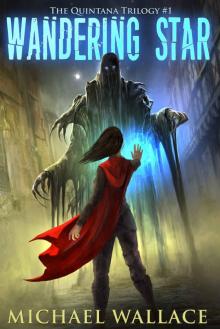 Wandering Star (The Quintana Trilogy Book 1)
Wandering Star (The Quintana Trilogy Book 1) Bladedancer
Bladedancer Sword Saint
Sword Saint The Alliance Trilogy
The Alliance Trilogy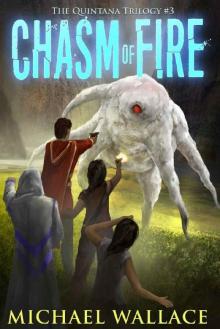 Chasm of Fire
Chasm of Fire Bladedancer (The Sword Saint Series Book 4)
Bladedancer (The Sword Saint Series Book 4) The Devil's Deep
The Devil's Deep Shadow Walker (The Sword Saint Series Book 3)
Shadow Walker (The Sword Saint Series Book 3) Starship Blackbeard
Starship Blackbeard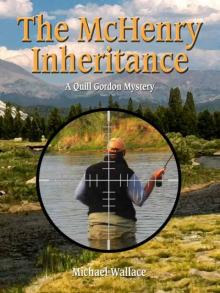 The McHenry Inheritance (Quill Gordon Mystery Book 1)
The McHenry Inheritance (Quill Gordon Mystery Book 1) Sun King (The Void Queen Trilogy Book 3)
Sun King (The Void Queen Trilogy Book 3) Blood of Vipers
Blood of Vipers Righteous - 01 - The Righteous
Righteous - 01 - The Righteous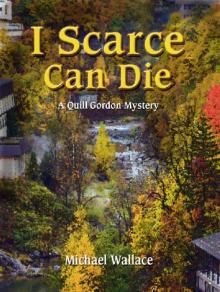 I Scarce Can Die (Quill Gordon Mystery Book 5)
I Scarce Can Die (Quill Gordon Mystery Book 5)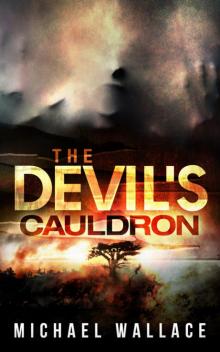 The Devil's Cauldron
The Devil's Cauldron The Wicked (The Righteous)
The Wicked (The Righteous) Crow Hollow
Crow Hollow Righteous03 - The Wicked
Righteous03 - The Wicked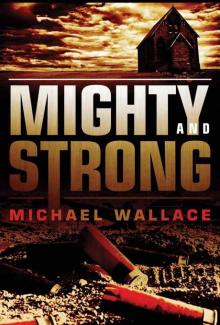 Righteous02 - Mighty and Strong
Righteous02 - Mighty and Strong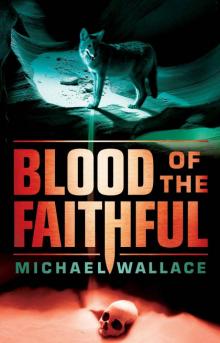 Blood of the Faithful
Blood of the Faithful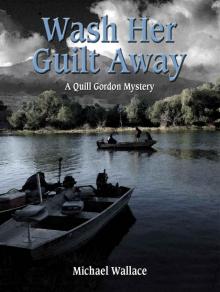 Wash Her Guilt Away (Quill Gordon Mystery Book 2)
Wash Her Guilt Away (Quill Gordon Mystery Book 2) The Kingdom of the Bears
The Kingdom of the Bears The Emerald Crown (The Red Sword Trilogy Book 3)
The Emerald Crown (The Red Sword Trilogy Book 3) The Dark Citadel
The Dark Citadel The Warrior King (Book 4)
The Warrior King (Book 4) Rebellion of Stars (Starship Blackbeard Book 4)
Rebellion of Stars (Starship Blackbeard Book 4)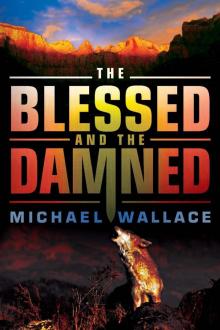 Righteous04 - The Blessed and the Damned
Righteous04 - The Blessed and the Damned The Crescent Spy
The Crescent Spy Queen of the Void (The Void Queen Trilogy Book 1)
Queen of the Void (The Void Queen Trilogy Book 1) The Red Sword (The Red Sword Trilogy Book 1)
The Red Sword (The Red Sword Trilogy Book 1) The Sentinel (The Sentinel Trilogy Book 1)
The Sentinel (The Sentinel Trilogy Book 1) The Golden Griffin (Book 3)
The Golden Griffin (Book 3)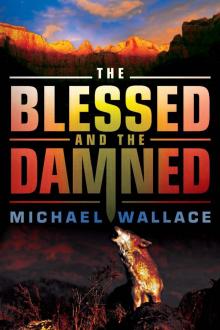 The Blessed and the Damned (Righteous Series #4)
The Blessed and the Damned (Righteous Series #4)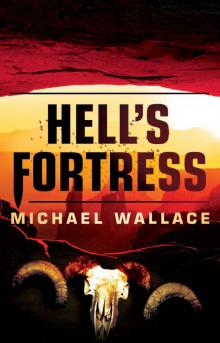 Hell's Fortress
Hell's Fortress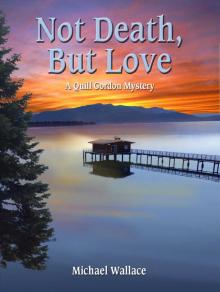 Not Death, But Love (Quill Gordon Mystery Book 3)
Not Death, But Love (Quill Gordon Mystery Book 3) Destroying Angel
Destroying Angel The Free Kingdoms (Book 2)
The Free Kingdoms (Book 2) Dragon Quadrant (The Sentinel Trilogy Book 2)
Dragon Quadrant (The Sentinel Trilogy Book 2) Shattered Sun (The Sentinel Trilogy Book 3)
Shattered Sun (The Sentinel Trilogy Book 3)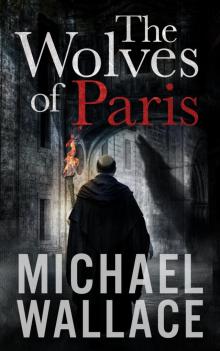 The Wolves of Paris
The Wolves of Paris Lords of Space (Starship Blackbeard Book 2)
Lords of Space (Starship Blackbeard Book 2) Dreadnought (Starship Blackbeard Book 3)
Dreadnought (Starship Blackbeard Book 3) The Village of Dead Souls: A Zombie Novel
The Village of Dead Souls: A Zombie Novel The Black Shield (The Red Sword Book 2)
The Black Shield (The Red Sword Book 2)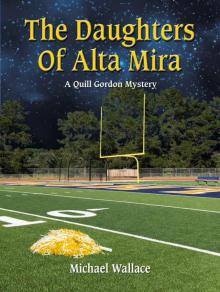 The Daughters Of Alta Mira (Quill Gordon Mystery Book 4)
The Daughters Of Alta Mira (Quill Gordon Mystery Book 4) Mighty and Strong (The Righteous)
Mighty and Strong (The Righteous)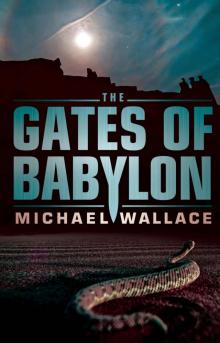 The Gates of Babylon
The Gates of Babylon